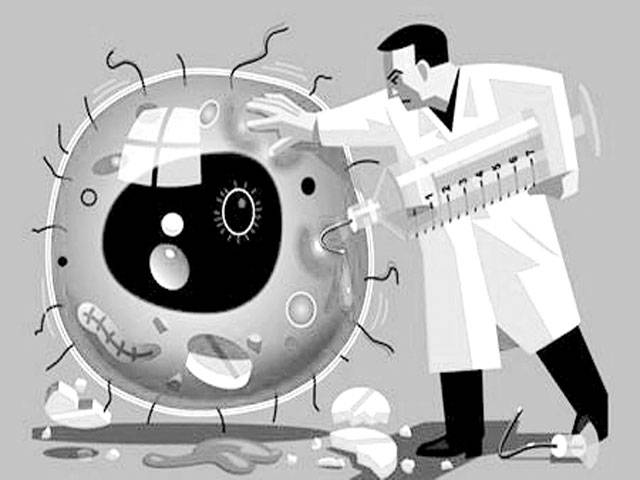AFP
LONDON
Britain is to lead a global effort to combat antibiotic-resistant superbugs that threaten to knock medicine ‘back into the dark ages,’ Prime Minister David Cameron said Wednesday. Unless new antibiotics are found, the rise of untreatable bacteria threatens a ‘unthinkable scenario’ where once-treatable minor infections become fatal, he said. As bacteria and viruses develop resistance to existing antibiotics, the effectiveness of such treatments naturally diminishes. Cameron privately raised the issue with US President Barack Obama and German Chancellor Angela Merkel at the G7 summit last month and believes he has their agreement for a co-ordinated international push. ‘This is not some distant threat but something happening right now,’ Cameron told The Times newspaper.
‘If we fail we are looking at an almost unthinkable scenario where antibiotics no longer work and we are cast back into the dark ages of medicine where treatable infections and injuries will kill once again. ‘That simply cannot be allowed to happen and I want to see a stronger, more coherent global response.’
Jim O’Neill, the former chief economist of US investment bank Goldman Sachs, is to lead an interational expert group aiming to spark the development of a new generation of antibiotics. He has been tasked with considering how developing countries can be encouraged to improve control of existing antibiotics, of which only five new types have been introduced since the 1960s.
Scientific advisers ‘are all saying this is one of the most serious health problems the world faces,’ Cameron said. ‘For many of us we only know a world where infections or sicknesses can be quickly remedied by a visit to the doctor and a course of antibiotics. ‘But that protection is at risk as never before. Resistance to antibiotics is now a very real and worrying threat.’ The initial £500,000 ($860,000, 630,000 euros) cost of the work will be met by the Wellcome Trust biomedical research charity.
Drug-resistant bacteria, viruses and parasites threaten not only the ability to treat deadly infections but also most aspects of modern medicine, said the trust’s director Jeremy Farrar. ‘From cancer treatment to Caesarean sections, therapies that save thousands of lives every day rely on antibiotics that could soon be lost,’ he said. ‘We are failing to contain the rise of resistance, and failing to develop new drugs to replace those that no longer work. We are heading for a post-antibiotic age.’
Saturday, April 20, 2024
Britain launches global superbug fight

Caption: Britain launches global superbug fight
Pak economy improving, funds will be provided on request: IMF
9:57 PM | April 19, 2024
Minister advocates for IT growth with public-private collaboration
9:57 PM | April 19, 2024
Judges' letter: IHC seeks suggestions from all judges
9:55 PM | April 19, 2024
Formula 1 returns to China for Round 5
9:05 PM | April 19, 2024
Germany head coach Julian Nagelsmann extends contract till 2026 World Cup
9:00 PM | April 19, 2024
A Tense Neighbourhood
April 19, 2024
Dubai Underwater
April 19, 2024
X Debate Continues
April 19, 2024
Hepatitis Challenge
April 18, 2024
IMF Predictions
April 18, 2024
Kite tragedy
April 19, 2024
Discipline dilemma
April 19, 2024
Urgent plea
April 19, 2024
Justice denied
April 18, 2024
AI dilemmas unveiled
April 18, 2024
ePaper - Nawaiwaqt
Advertisement
Nawaiwaqt Group | Copyright © 2024





